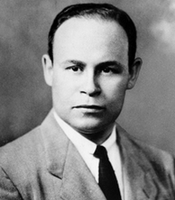










Charles Richard Drew was an American physician, surgeon, and medical researcher. He researched in the field of blood transfusions, developing improved techniques for blood storage, and applied his expert knowledge to developing large-scale blood banks early in World War II. This allowed medics to save thousands of lives of the Allied forces.The research and development aspect of his blood storage work is disputed.As the most prominent African-American in the field, Drew protested against the practice of racial segregation in the donation of blood, as it lacked scientific foundation, an action which cost him his job.
Early Life
Drew was born in 1904 into an African-American middle-class family in Washington, D.C. His father, Richard, was a carpet layer and his mother, Nora Burrell, was a teacher.Drew and his siblings grew up in DC's Foggy Bottom neighborhood and he graduated from Dunbar High School in 1922.Drew won an athletics scholarship to Amherst College in Massachusetts,where he graduated in 1926.An outstanding athlete at Amherst,Drew also joined Omega Psi Phi fraternity.He attended medical school at McGill University in Montreal, Canada, receiving his M.D. in 1933 as well as a Master of Surgery degree,and ranked 2nd in his class of 127 students.A few years later, Drew did graduate work at Columbia University, where he earned his Doctor of Medical Science degree, becoming the first African American to do so.
Father of Blood Banks
In 1938, Drew received a Rockefeller Fellowship to study at Columbia University and train at the Presbyterian Hospital in New York City. There, he continued his exploration of blood-related matters with John Scudder. Drew developed a method for processing and preserving blood plasma, or blood without cells. Plasma lasts much longer than whole blood, making it possible to be stored or "banked" for longer periods of time. He discovered that the plasma could be dried and then reconstituted when needed. His research served as the basis of his doctorate thesis, "Banked Blood," and he received his doctorate degree in 1940. Drew became the first African-American to earn this degree from Columbia.
As World War II raged in Europe, Drew was asked to head up a special medical effort known as "Blood for Britain." He organized the collection and processing of blood plasma from several New York hospitals, and the shipments of these life-saving materials overseas to treat causalities in the war. According to one report, Drew helped collect roughly 14,500 pints of plasma.
In 1941, Drew worked on another blood bank effort, this time for the American Red Cross. He worked on developing a blood bank to be used for U.S. military personnel. But not long into his tenure there, Drew became frustrated with the military's request for segregating the blood donated by African Americans. At first, the military did not want to use blood from African Americans, but they later said it could only be used for African-American soldiers. Drew was outraged by this racist policy, and resigned his post after only a few months.
Death and Legacy
Beginning in 1939, Drew traveled to Tuskegee, Alabama to attend the annual free clinic at the John A. Andrew Memorial Hospital.For the 1950 Tuskegee clinic, Drew drove along with three other black physicians. Drew was driving around 8 a.m. on April 1. Still fatigued from spending the night before in the operating theater, Drew lost control of the vehicle. After careening into a field, the car somersaulted three times. The three other physicians suffered minor injuries. Drew was trapped with serious wounds; his foot had become wedged beneath the brake pedal. When reached by emergency technicians, Drew was in shock and barely alive due to severe leg injuries.
Drew was taken to Alamance General Hospital in Burlington, North Carolina.He was pronounced dead a half hour after he first received medical attention.
Spingarn Medal